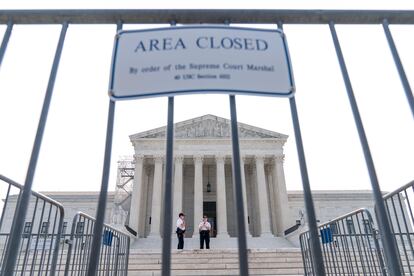The Supreme Court will decide if some judges have gone too far in striking down gun restrictions
The justices will hear the Biden administration’s appeal of one such ruling that struck down as unconstitutional a federal law meant to keep guns away from people who have domestic violence restraining orders against them

A year after its sweeping gun rights ruling, the Supreme Court agreed Friday to decide whether judges are going too far in striking down restrictions on firearms.
The justices will hear the Biden administration’s appeal of one such ruling that struck down as unconstitutional a federal law meant to keep guns away from people who have domestic violence restraining orders against them.
Arguments will take place in the fall in the first case in which the court could define the limits on new standards for evaluating gun laws that its conservative majority set out last June.
That decision in the case, which has come to be known as Bruen, has upended gun laws across the country. It’s led to a rash of rulings invalidating some long-standing restrictions on firearms, but also produced confusion about what laws can survive.
Governments have to justify gun control laws by showing they are “consistent with the Nation’s historical tradition of firearm regulation,” Justice Clarence Thomas wrote in an opinion that was joined by the other five conservative justices. Until that ruling, judges could consider whether a law serves public interests such as enhancing public safety.
In the past year, judges also have struck down federal laws barring people from having guns if they have been charged with serious crimes or use marijuana. Other rulings have called into question a federal ban on possessing guns with serial numbers removed, the prohibition on licensed federal firearms dealers selling handguns to young adults under 21 and Delaware’s ban on the possession of homemade “ghost guns.”
Lower courts are also considering challenges to states’ bans on the sale of so-called assault weapons and large-capacity magazines. The Supreme Court in May denied an emergency request to put an Illinois law on hold while that court challenge plays out.
The case now before the court involves Zackey Rahimi, whose conviction on possessing guns while subject to a restraining order was thrown out by a panel of three Republican appointees on the 5th U.S. Circuit Court of Appeals.
Rahimi was involved in five shootings over two months in and around Arlington, Texas, U.S. Circuit Judge Cory Wilson noted. When police identified Rahimi as a suspect in the shootings and showed up at his home with a search warrant, Rahimi admitted both to having guns in the house and being subject to a domestic violence restraining order that prohibited gun possession, Wilson wrote.
But though “hardly a model citizen,” Rahimi did not lose his constitutional right to have guns, Wilson concluded. The law at issue could not be justified by looking to history, he wrote for a unanimous panel.
Wilson and Judge James Ho were nominated by President Donald Trump. The third judge, Edith Jones, was chosen by President Ronald Reagan.
The appeals court initially upheld the conviction, then reconsidered once the Supreme Court ruled in Bruen. At least one district court has upheld the law since the Bruen decision
Solicitor General Elizabeth Prelogar, the Biden administration’s top Supreme Court lawyer, cited an earlier high court decision involving gun bans for domestic violence convictions to urge the justices to take up the case. “More than a million acts of domestic violence occur in the United States every year, and the presence of a firearm increases the chance that violence will escalate to homicide,” Prelogar wrote.
On the day the court finished deciding the cases argued in recent months, the legal fight over a gun law was among six cases that the justices added to their agenda for the term that begins on the first Monday in October.
Sign up for our weekly newsletter to get more English-language news coverage from EL PAÍS USA Edition
Tu suscripción se está usando en otro dispositivo
¿Quieres añadir otro usuario a tu suscripción?
Si continúas leyendo en este dispositivo, no se podrá leer en el otro.
FlechaTu suscripción se está usando en otro dispositivo y solo puedes acceder a EL PAÍS desde un dispositivo a la vez.
Si quieres compartir tu cuenta, cambia tu suscripción a la modalidad Premium, así podrás añadir otro usuario. Cada uno accederá con su propia cuenta de email, lo que os permitirá personalizar vuestra experiencia en EL PAÍS.
¿Tienes una suscripción de empresa? Accede aquí para contratar más cuentas.
En el caso de no saber quién está usando tu cuenta, te recomendamos cambiar tu contraseña aquí.
Si decides continuar compartiendo tu cuenta, este mensaje se mostrará en tu dispositivo y en el de la otra persona que está usando tu cuenta de forma indefinida, afectando a tu experiencia de lectura. Puedes consultar aquí los términos y condiciones de la suscripción digital.








































